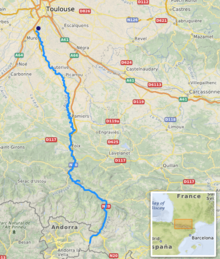The Ariège (French pronunciation: [aʁjɛʒ] ; Occitan: Arièja; Catalan: Arieja) is a river in southern France, a right tributary of the Garonne.[1] From its source in the Pyrenees near El Pas de la Casa, the river flows north, forming part of the border with Andorra, and passing through the following towns in two departments:
- In Ariège: Ax-les-Thermes, Les Cabannes, Tarascon-sur-Ariège, Montgailhard, Foix, Varilhes, Pamiers, Saverdun.
- In Haute-Garonne: Cintegabelle, Auterive, Pinsaguel.
| Ariège | |
|---|---|
 The Ariège near Ax-les-Thermes | |
 | |
| Location | |
| Countries | |
| Physical characteristics | |
| Source | |
| • location | Pyrenees |
| • elevation | ± 2,400 m (7,900 ft) |
| Mouth | |
• location | Garonne |
• coordinates | 43°31′2″N 1°24′36″E / 43.51722°N 1.41000°E |
| Length | 163 km (101 mi) |
| Basin size | 3,860 km2 (1,490 sq mi) |
| Discharge | |
| • average | 65 m3/s (2,300 cu ft/s) |
| Basin features | |
| Progression | Garonne→ Gironde estuary→ Atlantic Ocean |
Its longest tributaries are the Hers-Vif and the Lèze. It flows into the Garonne in Portet-sur-Garonne, south of Toulouse.[1] Taken literally, the Latin origin of the river's name, Aurigera, indicates it to be a source of gold.
References
editExternal links
editWikimedia Commons has media related to Ariège River.